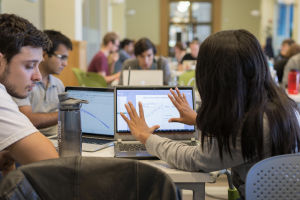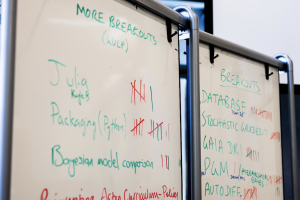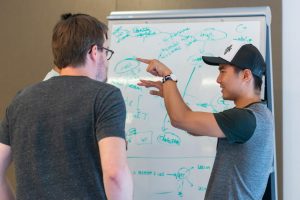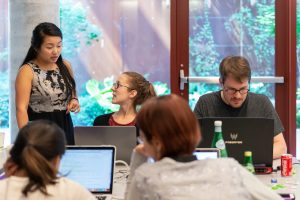Daniela Huppenkothen is the Associate Director at the Institute for Data-Intensive Research in Astrophysics and Cosmology (DIRAC) at the University of Washington and a Data Science Fellow at the University of Washington’s eScience Institute, where she works on astrostatistics for astronomical time series, and is interested in everything from asteroids to black holes. She is excited about teaching data science to astronomers and researchers from other scientific disciplines, and about finding new ways to get researchers across different scientific domains to talk to one another.
Earlier this year, I visited the Niels Bohr Institute in Copenhagen for a meeting. There, on the wall of the conference room, was a photo of a famous physics conference which had taken place in that same room some 90 years earlier in 1929. As I looked at that photo, something occurred to me: the way we communicate about science hasn’t really changed all that much in the last few centuries. When I went to the AAS winter meeting, I saw much the same: people sitting in rows, staring at the speaker (or their slides) up front. Or reading their emails.
When there are discussions about whether academia really needs expensive, time-consuming, and environmentally problematic academic conferences, the core argument is always that yes, we do, because nothing replaces the face-to-face contact that encourages communication, throwing around ideas, building new collaborations. But that often doesn’t happen in traditional conferences, except during the usually too-short coffee breaks, which researchers love for exactly that reason: they are a time and space for informal discussions.
Here, then, is the question that I’ve been asking myself: can we build a scientific meeting that consists purely of coffee breaks? Can we build meetings and workshops that take the things that make coffee breaks valuable to researchers—communication, collaboration, networking—and amplify them? For the past five years, I’ve been co-organizing one of these meetings: Astro Hack Week, a five-day workshop where roughly fifty participants come together to learn, share their knowledge, and work together on data science-related projects in astronomy.


(Astro Hack Week 2016; Credit: Daniela Huppenkothen)
With hack weeks now being organized in several different fields, a group of us who work on hack weeks and other participant-driven workshops in astronomy, neuroscience, geosciences, and image analysis decided it was high time to write down our philosophy and experiences. The result is now published in an open-access article in PNAS, where we describe our motivation for organizing these events, some core principles, and also present results and outcomes from our evaluations. Hack weeks require a lot of careful facilitation (more so than ordinary conferences). But if that facilitation is present, they are effective at teaching data science tools and methods to domain scientists, and they encourage open science and (interdisciplinary) collaboration. And, of course, an ample supply of coffee is a must! The paper provides an overview of the concepts, while the supplementary materials in particular are intended to be a resource for researchers from all academic disciplines. These materials provide a toolbox of ideas, best practices, and our experiences to help them organize their own events.
One thing that’s become clear during our work together is that there isn’t one true way to run your participant-driven workshop. Many of our decisions are based on the needs of our specific scientific community, and our knowledge around hack weeks and participant-driven workshops is still growing and changing. So here’s my question to all of you: What will (interdisciplinary) collaborations of the future look like? How do we as researchers want to interact and work with each other?


(NeuroHackademy 2018; Credit: Alex Alspaugh/University of Washington)
As part of writing this post, I ended up looking up more details about the Copenhagen Meetings, and was both surprised and excited to read that unlike the conferences I was used to, they actually had very little of a formal programme, and lots of discussion time for researchers to talk about questions they found interesting and important at the time. In reality, it has much more in common with modern unconferences, participant-driven workshops where the focus is on discussions, than with large conferences. It’ i’s inspiring to see that in every generation, scientists value improving communication, and I am excited to see what models of interaction and collaboration future generations of researchers (re-)discover.